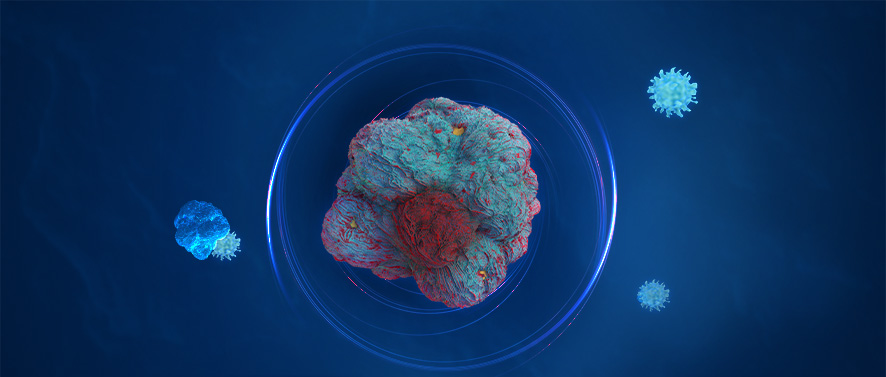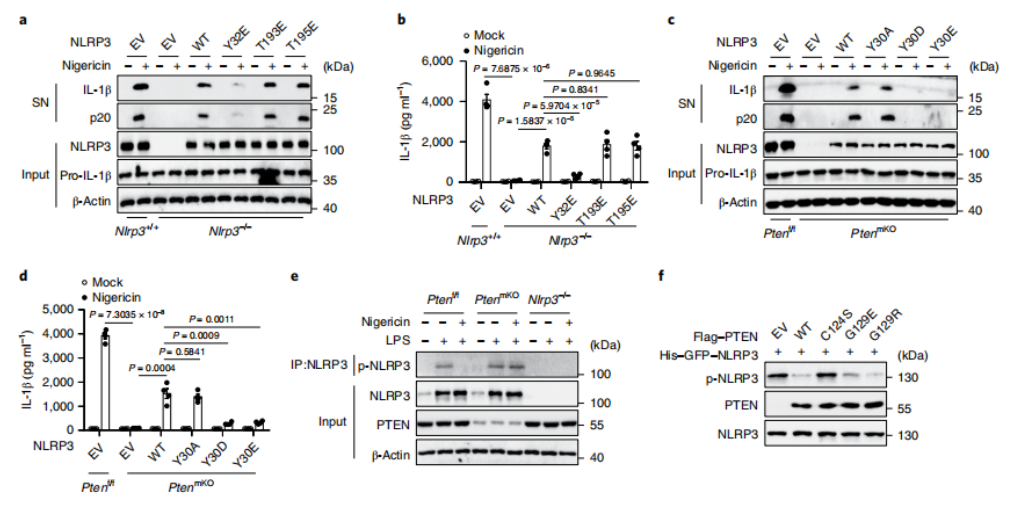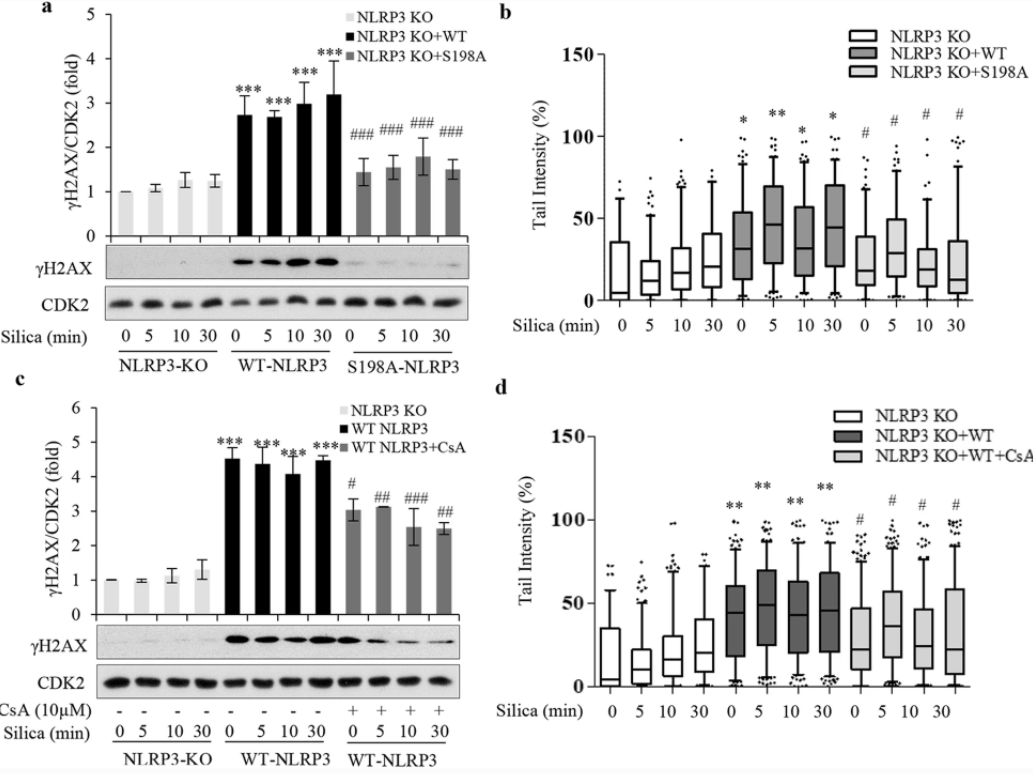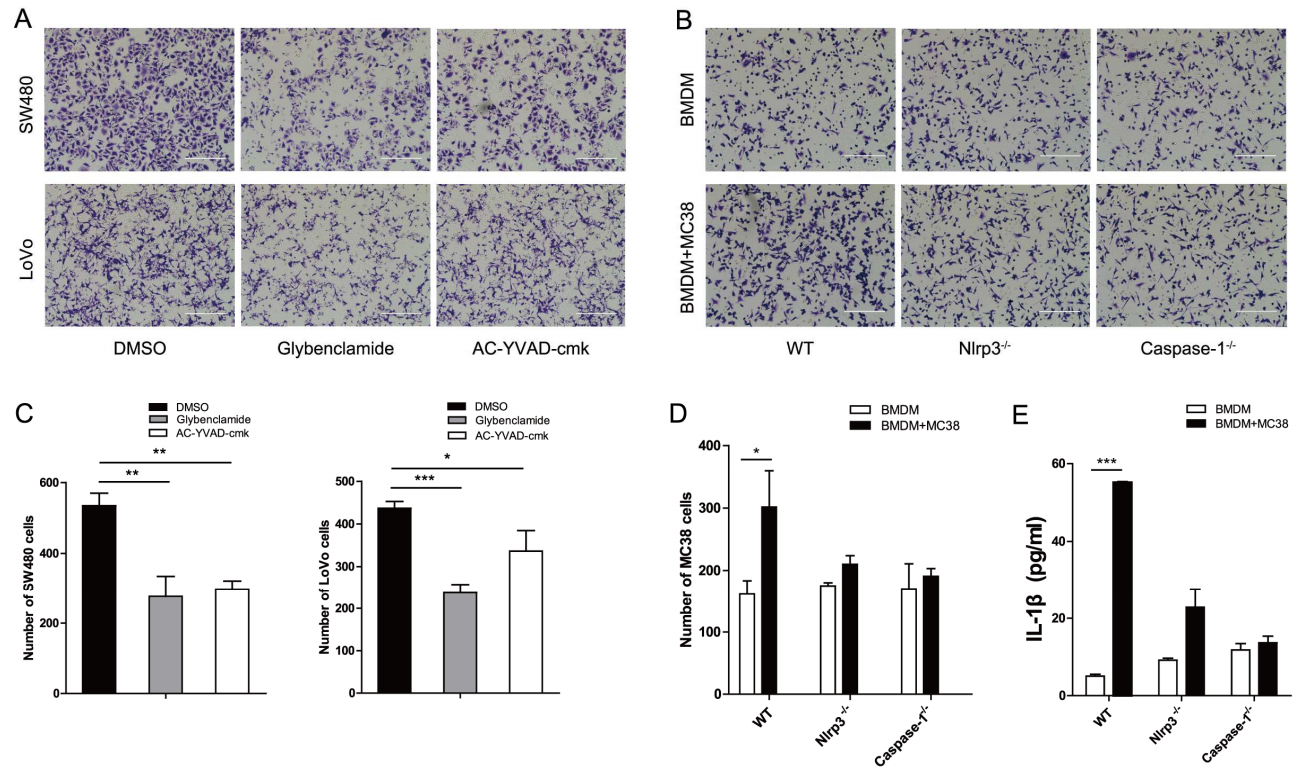NLRP3, an emerging cancer
treatment target
Ubigene has its KO cell line in
stock!

NLRP3 inflammasome is a large intracellular polymeric protein
complex formed in the cytosol, which can be produced due to the endogenous inflammatory immune response of
cells. The formation of inflammasome can activate the inflammatory protease Caspase-1, thus promoting the
maturation and release of inflammatory cytokines interleukin-1β (IL-1β) and
IL-18, leading to the death of inflammatory cells (pyroptosis). Inflammation is the main sign of the occurrence
and deterioration of cancer, and it affects cancer in various aspects, including proliferation, invasion,
angiogenesis and metastasis. More importantly, the release of inflammatory factors mediated by various cells in
the tumor microenvironment plays a key role in these processes. Since NLRP3 inflammasome is the innate immune
center that mediates the secretion of proinflammatory cytokines, its interaction with other cell compartments
plays a major role in regulating inflammatory response. However, it has been found that NLRP3 may play a dual
role in the development of cancer - it can both promote and inhibit the occurrence of cancer. Its inhibitory
effect is mainly reflected in colitis associated colorectal cancer (CAC), while its promoting effect is
particularly obvious in other cancers, such as gastric cancer and skin cancer. In this article, we introduce
some progress of NLRP3 inflammasome in cancer research.

Figure 1. Roles of NLRP3 in cancer
Myeloid PTEN promotes chemotherapy-induced NLRP3-inflammasome
activation and antitumour immunity [1]
PTEN is a dual-specificity phosphatase that is frequently mutated
in human cancer, and its deficiency in cancer has been associated with therapy resistance and poor survival. On
May 4, 2020, a research team led by the University of Science and Technology of China and Fudan University found
that PTEN protein in myeloid cells can improve anti-tumor immunity induced by chemotherapy by promoting the
activation of NLRP3 inflammasome.
To explore the effect of PTEN on the activation of inflammasome at the cellular level, researchers used CRISPR/Cas9 gene editing
technology to construct NLRP3-KO THP-1 cell line and NLRP3 point mutations (Y32E, T193E and T195E) THP-1 cell
lines to simulate the dephosphorylation process of NLRP3, and determined the mechanism of PTEN promoting the
activation of NLRP3 inflammasome by inducing the dephosphorylation of NLRP3
tyrosine in 32 locus.

Figure 2. PTEN mediated dephosphorylation of NLRP3 tyrosine in 32 locus is critical for the activation of inflammasome
NLRP3 KO THP-1 cell line used in this study is a off-shelf KO cell line in Ubigene KO cell bank. Now enjoy a limited-time promotional price of $1780, and the the homozygote deliver in one week!
There are more 3000 KO cell lines in our KO cell bank, click here to
explore your ideal KOs>>
Crystalline silica particles cause rapid NLRP3-dependent
mitochondrial depolarization and DNA damage in airway epithelial cells[2]
Respirable crystalline silica can cause lung
carcinomas. Researchers took silica as the research object and found that it can cause the activation of NLRP3
inflammasome and mitochondrial depolarization. Further study found that interference and knockout of NLRP3 could
prevent mitochondrial depolarization and DNA damage induced by silica, and overexpression of NLRP3 gene in
NLRP3-KO cells could induce such damage again. This shows that silica can induce DNA damage and double strand
breaks in airway epithelial cells, providing direct evidence for the mechanism of action of
respirable crystalline silica particles in inducing lung cancer, and revealing the key
role of NLRP3 inflammasome in this process.

Figure 3. NLRP3 is critical to silica induced DNA
damage
Ubigene provides customized
services of NLRP3 interference and knockout! Exclusive CRISPR-U™ technology improves editing efficiency by 10-20 times, and
custom NLRP3 knocksout cell line delivered in 4 weeks! NLRP3 interference cell line only $1780, and the delivery
is as fast as 6 weeks! Click to consult for more service details>>
NLRP3 inflammasomes in macrophages drive colorectal cancer
metastasis to the liver[3]
As a widely distributed effector of innate immunity, NLRP3
inflammasome affects development of many cancer types, but its exact role in colorectal cancer (CRC) is
controversial. Researchers found that cells with the macrophage (MΦ) marker
CD68 and strong NLRP3 expression densely surrounded CRC tissue. And further found that NLRP3 inflammasome was
activated in MΦs by MΦ-CRC cell crosstalk. NLRP3 signaling
activation in MΦs can contribute to CRC cell migration and invasion. To explore the
role of NLRP3 in the proliferation and metastasis of CRC cells, researchers constructed SW480 and LoVo cell
models of NLRP3-KO, and found that blocking NLRP3 signal transduction would inhibit the migration of CRC cells
in vitro. This conclusion was also verified in the NLRP3-KO mouse model. Moreover, the researchers also found
that the activation of NLRP3 signal can improve the migration and invasion ability of CRC cells. This series of
experimental results support the idea that the development of NLRP-driven CRC.

Figure 4. NLRP3 knockout inhibits metastasis of
colorectal cancer (CRC) cells
Both the promotion and
inhibition of NLRP3 are of great significance to the research on the mechanism of the occurrence and development of
cancer and the development of drug targets. NLRP3 may become a new target for cancer treatment, and in-depth
research on the specific mechanism of its impact on the development of cancer is expected to provide a new direction
for anti-cancer cancer drug discovery!
In addition to NLRP3, Ubigene has a number of cancer-related genes KO
cell lines in stock, including NOTCH1, EGFR, MYC, STAT3, p53, STAT3, and 20 selected popular KO in stock at a special price of $1780! Contact us to know
more↓
Table 1. Promotional gene list

Reference
[1] Huang Y, Wang H, Hao Y, et al. Myeloid PTEN
promotes chemotherapy-induced NLRP3-inflammasome activation and antitumour immunity[J]. Nature Cell Biology, 2020,
22(6): 716-727.
[2] Wu R, Högberg J,
Adner M, et al. Crystalline silica particles cause rapid NLRP3-dependent mitochondrial depolarization and DNA damage
in airway epithelial cells[J]. Particle and fibre toxicology, 2020, 17(1): 1-20.
[3] Deng Q, Geng Y,
Zhao L, et al. NLRP3 inflammasomes in macrophages drive colorectal cancer metastasis to the liver[J]. Cancer
Letters, 2019, 442: 21-30.
 Subscribe Us
Subscribe Us Gene Editing Services
Gene Editing Services
 EZ-editor™
EZ-editor™ Red Cotton Gene knockout Project
Red Cotton Gene knockout Project













